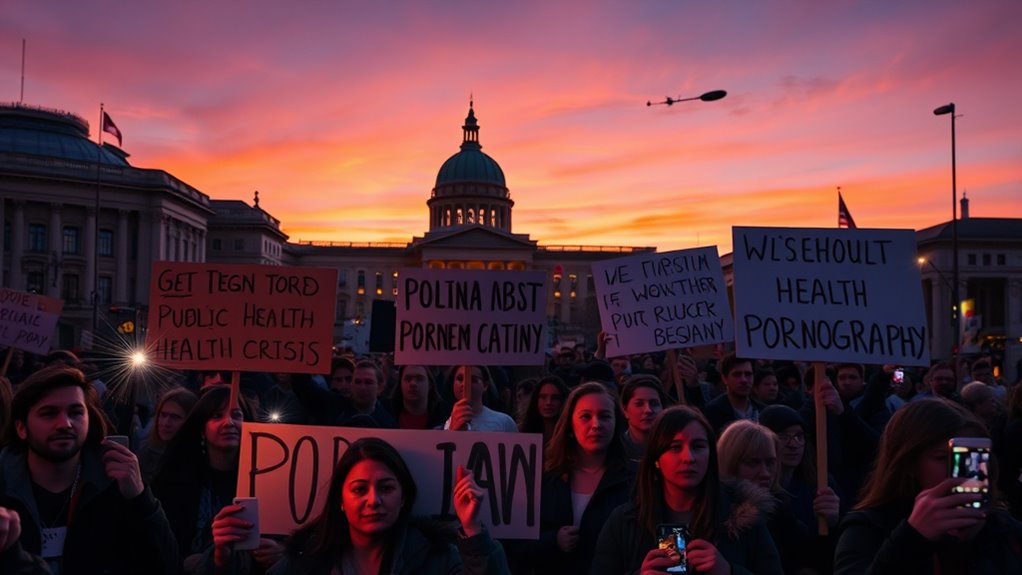Many states see pornography as a public health crisis because widespread access affects mental health, relationships, and social norms. Excessive use can lead to addiction-like behaviors and unrealistic expectations about intimacy. To combat these issues, some states are implementing laws to limit access, protect minors, and promote healthier attitudes. They also support education and mental health treatment. If you want to understand why this has gained such attention and what’s being done, keep exploring the latest developments.
Key Takeaways
- States are recognizing pornography’s impact on mental health, relationships, and societal norms, framing it as a public health issue.
- Legislation aims to restrict access to protect minors and vulnerable populations from harmful content exposure.
- Excessive consumption is linked to addiction-like behaviors and negative psychological effects, prompting targeted treatment efforts.
- Digital platforms and technology influence consumption patterns, necessitating policies to safeguard online content and prevent exposure.
- Education initiatives focus on promoting healthy sexuality and awareness of pornography’s risks to mitigate long-term societal impacts.

While often dismissed as harmless entertainment, pornography has increasingly become a significant public health issue. You might not see the immediate dangers, but the widespread availability of explicit material online affects mental health, relationships, and societal norms. Many people turn to porn as a way to explore sexuality or escape stress, but the reality is that excessive consumption can lead to harmful patterns. Research indicates that frequent exposure can distort perceptions of intimacy and consent, leading to unrealistic expectations and dissatisfaction in real-life relationships. It can also foster addiction-like behaviors, where individuals find themselves unable to control their consumption, resulting in feelings of shame, guilt, or isolation.
Pornography’s impact on mental health and relationships is a growing public health concern.
Some states are beginning to recognize these risks and are taking steps to address them. Legislation is being introduced to limit access to certain types of pornographic content, especially targeting minors and vulnerable populations. These measures aim to reduce exposure to material that may promote unhealthy attitudes toward sex and violence. You might see laws requiring age verification systems or stricter regulations on websites that host explicit content. The goal is to protect children from early exposure and prevent the normalization of harmful behaviors. States are also funding public awareness campaigns to educate people about the potential dangers of excessive porn use and to promote healthier attitudes toward sexuality.
The push for regulation isn’t just about censorship; it’s about understanding that pornography can have measurable impacts on mental health. Some individuals develop compulsive habits that interfere with daily life, affecting work, social interactions, and emotional well-being. Mental health professionals are increasingly recognizing porn addiction as a real concern, comparable to other behavioral addictions. As a result, some states are advocating for better access to counseling and treatment programs tailored to these issues. They want to create environments where people can seek help without stigma, acknowledging that overcoming problematic porn consumption requires support and understanding. Additionally, research into the role of technology in shaping consumption patterns underscores the importance of comprehensive approaches to this public health challenge. Recognizing the influence of digital platforms can help inform more effective policy responses. Furthermore, understanding the cybersecurity vulnerabilities associated with online content can be crucial in safeguarding minors and vulnerable populations from exposure.
In addition, these legislative efforts are often paired with discussions around education. Many states are considering or implementing extensive sex education that includes discussions about healthy sexuality, consent, and the potential risks associated with pornography. By equipping individuals with accurate information, policymakers hope to foster healthier attitudes and reduce the likelihood of harmful habits developing. It is also essential to address the psychological impact that excessive porn consumption can have on individuals, which can be long-lasting if left unaddressed. Recognizing how neuroplasticity may be affected by habitual consumption underscores the importance of early intervention and ongoing support. Ultimately, the movement to regulate and educate around porn underscores a growing recognition that, despite its ubiquity, it’s not just harmless entertainment. It’s a complex public health challenge that demands thoughtful action to protect individuals and society at large.
Frequently Asked Questions
How Effective Are State Measures in Reducing Porn Consumption?
State measures can be somewhat effective in reducing porn consumption, especially when they include strict regulations and public awareness campaigns. You might notice a decrease in access or exposure, but enforcement varies and some people find ways around restrictions. Ultimately, these policies shape behavior by limiting availability and prompting discussions about potential harms. However, their success depends on consistent enforcement and the willingness of individuals to adapt to new rules.
What Mental Health Issues Are Linked to Excessive Porn Use?
You might think it’s just entertainment, but excessive porn use can take a toll on your mental health. It’s linked to anxiety, depression, and feelings of shame or guilt. You could find your self-esteem taking a hit or struggle with intimacy issues. It’s important to recognize these signs early, because ignoring them can cause more harm than you realize. Don’t let it be a wolf in sheep’s clothing—seek help if needed.
Are There Legal Protections for Adult Viewers Against Censorship?
You’re protected by legal rights that limit censorship of adult content. Laws like the First Amendment in the U.S. prevent government restrictions on free speech, including mature material, as long as it doesn’t involve illegal activity or non-consensual content. However, states can regulate access to pornography, especially for minors. As an adult viewer, you should be aware of your rights, but some restrictions may still apply depending on your location.
How Does Porn Impact Teenage Brain Development?
You might wonder how porn affects teenage brain development. It can alter how your brain processes pleasure and reward, especially since your brain is still developing. Exposure to explicit content may influence your understanding of relationships and expectations. It can also lead to issues like addiction or desensitization. Being aware of these impacts helps you make healthier choices and understand the importance of age-appropriate content during your developmental years.
What Alternative Resources Are Available for Those Struggling With Porn Addiction?
If you’re struggling with porn addiction, you have options. Consider seeking help from a mental health professional who specializes in addiction. Support groups like Sex Addicts Anonymous provide community and accountability. You can also explore online resources and apps designed for recovery. Journaling, practicing mindfulness, and engaging in healthy activities help replace harmful habits. Remember, recovery is possible, and taking action is the first step toward regaining control.
Conclusion
Think of porn as a storm brewing on your horizon—at first distant, but growing stronger. Some states are raising their shields, recognizing the storm’s potential to flood lives with harm. By taking a stand, they aim to steer their communities to calmer waters. You can choose to navigate wisely, staying alert to the dangers and seeking safe harbors. Together, we can weather this storm and protect our well-being from the relentless tide.









